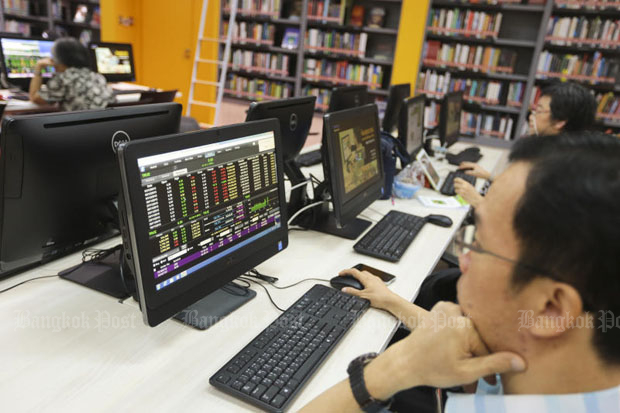
The Stock Exchange of Thailand (SET) plunged to this year's lowest closing on Christmas Day as previous heavy losses on Wall Street, a partial US government shutdown and declining oil prices triggered investors' panic selling.
The SET index kicked off 2018 with a bang, reaching an all-time high of 1,838.96 points. But that bull run dissipated into thin air as the bourse shed its gain by more than 250 points as of Dec 25.
Thailand's bourse fell by 2.2% as a storm of external factors sunk the SET index by 34.64 points to close at 1,556.65 points, in turnover worth 33 billion baht.
Institutional investors were net sellers of 2.91 billion baht, followed by brokerage firms selling 767.73 million and 12.54 million for foreign investors. On the other hand, retail investors were net buyers of 3.7 billion baht.
PTT shares led the stock market rout for large-cap equities, falling by 4.7%, followed by PTTEP (-4.3%), AOT (-3.5%), BEM (-2.5%) and SCB (-2.2%).
Poranee Thongyen, senior executive vice-president at Asia Plus Securities (ASP), said the SET index nosedive happened because of external factors, including the partial US government shutdown, a dip in oil prices to the lowest level since mid-2017 and fears of a global economic downturn.
"Oil prices have declined to below US$50 per barrel, reflecting concerns of a global economic recession," Mrs Poranee said.
ASP projects the bourse's support line at 1,555-1,585 points and suggests accumulative buying as the SET's price-to-earnings (P/E) ratio was logged at 13 times on Tuesday.
SCB Securities (SCBS) said in a research note that the SET index slipped after the US and regional stock markets responded to concerns of a global economic downturn, President Trump's criticism of the Federal Reserve's interest rate normalisation and a sharp fall in oil prices.
Poor sentiment has pressured oil and refinery stocks to edge lower, according to SCBS.
Jitra Amornthum, head of research at Finansia Syrus Securities, said the thin trading volume, inflows from year-end investment in long-term equity funds (LTFs) and retirement mutual funds, and speculation about window dressing by mutual fund managers and portfolio managers will provide cushions for the SET index.
The gold price continues to rally relative to other assets, seen as a safe-haven investment, with a weakened dollar index and larger gold reserves in central banks, Ms Jitra said.
Gold is the only asset class traded that usually sees its price rise by year-end, she said.
The gold price is likely to rise to US$1,300 an ounce, the same level seen in late 2017, according to Finansia Syrus Securities.
Nuttachart Mekmasin, executive director of research at Trinity Securities, said the SET index's lower P/E ratio and an expected stock market rebound in January will help the bourse recover its gains.
"Trinity Securities views as a high opportunity that the 'January Effect' will return as institutional investors are holding plenty of cash to handle expected sales of LTF units next month," Mr Nuttachart said. "Market sentiment is deemed risk-averse, reflected by movement from equities and commodities to gold."